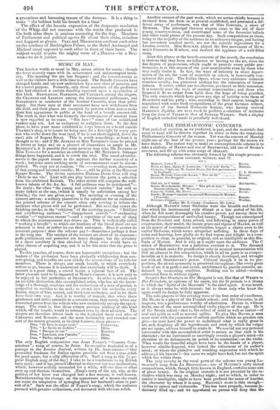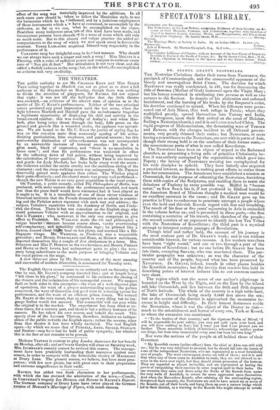THE PHILHARMONIC CONCERTS.
THE period of exertion, as we predicted, is past, and the materials that come to hand will be thrown together in order to form the remaining Philharmonic Concerts of the season. Yet was the concert of Monday night one of the best of the present year ; perhaps for the reason we have stated. The easiest way to make an unexceptionable scheme is to take a sinfonia of HAYDN and one of BEETHOVEN, add one of SPORE'S overtures, and fill up with some songs of MOZART.
The following scheme was obviously formed by this simple process— SIXTH CONCERT, MONDAY, MAY 17.
ACT!.
Sinfouia. Letter T. HAYDN.
Recit. ed Aria, Signor F. LABLACHE. ‘' 0 ror dell' Erebo " HANDEL. Concerto, Clartonet, M. JOSEPH Brass (his first performance in England) C. L. HANSSENS. Scene, Madame Cseattear ALLAN, " Non mi dir " MOZART.
Overture. Der Berggeist SPONS.
ACT II.
Sintlasia, in C minor BEETHOVEN. Scene, Mademoiselle ?drawl, " Non pid di tiori." Casco Bassett° Obligato, Mr. WILLIAMS MOZART. Concerto. Violin. Mr. DAVID Duetto, Madame CARADORI ALLAN and Mademoiselle MHEZEI,
(Tattered!) Rosetta.
Overture. Calypso WINTER.
Leader, Mr. T. Coma-Conductor. Mr. LIJOAS Although Havrne's letter Sinfonias want the breadth and freedom into which his instrumental style dilated at a late period of his life> when he felt more thoroughly his creative power, yet among them we shall find compositions of unrivalled beauty. Though not emancipated from the STAMITZ and ABEL school, and following, in many points of construction, their model, the innate grace and vigour of HAYDN, as well as his power of instrumental combination, impart a charm even to his earlier Siofonias, which seems altogether =fading. In these days of noise and humbug, how gladly do we find repose and delight in a com- position so clear, so graceful, so original, and so intelligible as this Sin- fonia of HAYDN. And it told as it ought upon the audience. The C minor of BEETHOVEN was a judicious contrast to it. The diseased appetite which seeks for gratification only in musical monstrosities will find no aliment in this composition, which in all its parts is as compre- hensible as it is majestic. Its design is clearly developed, and wrought out with all BEETHOVEN'S power. Colossal though it be in its pro- portions, the nicest symmetry is preserved throughout; like every great work of art it is perfect and entire, undeformed by puerile conceits, nn- debased by unmeaning crudities. Nothing can be added—nothing subtracted from it, without injury. SPOUR'S fine Overture to Der Berggeist is not, like that of WEBER to Der Freischutz, an epitome of his opera, but the fit prelude to a drama in which the " Spirit of the Mountain" is the chief agent. It was heard, as it always must be, with interest ; but to those only who know the opera could its design be fully apparent. The solo-players of this evening were of the first order of excellence. Mr. BLAES is a player of the Flemish school ; and his Concerto, in all respects, was a performance worthy of admiration. Davin is, without doubt, one of the most accomplished violin-players of the age. He is of the SPOHR school—that is, the school of mind as well as matter—of soul and spirit as well as manual agility. To play like DAVID, a man must start with the possession of certain qualities which no practice can give—he must have the power to understand what is really great in art, and, despising all the legerdemain and trick by which the vulgar are set agape, address himself to attain it. We needed not any personal intercourse with this accomplished artist to assure us that such is his character; for no instrument so unerringly reveals a player's mind—its elevation or its debasement, its polish or its coarseness—as the violin. What would the beautiful adagio have been in the hands of a player, however nimble-fingered, who lacked the refinement of its author's mind; or where the plaintive and touching expression with which he addressed his bearers ?—his notes we might have had, but not the spirit which lies within them.
The only novelty in the vocal parts of the scheme was young La- BLACHE'S song from La Besurrezione ; one of HANDEL'S early sacred compositions, which, though little known in England, contains some airs- of great beauty. In the original oratorio it is not preceded by the re- citative which was sung on Monday night; and to which, in order to render it intelligible, ought to have been prefixed the name of Lucifer, the character by whom it is sung. HANDEL'S score is thin enough2- violins in unison and violoncello. This has been properly, because ju- diciously filled up ; and we apprehend no person will deny that the effect of the song was materially improved by the additions. In all such cases care ihould taken to follow the Handelian style, to use the harmonies which he has indicated, and by a judicious employment of those instruments which w-e have at command, to accomplish by the orchestra, as far as we can, what he accomplished on the organ. Doubtless many indiscreet atted.'013 of this kind have been made, and incompetent persons have shovelh*d. in a mass of notes which add only so much noise. But to this absurd and vulgar practice the added ac- companiments to the song of which we now speak stood in favourable contrast. Young LABLACHE acquitted himself very respectably in the
performance of it.
CARADOET sang her delightful song in her best manner. Why should we not always have such a singer and such a song ? Miss MEERTI is a Fleming, with a voice of sufficient power and compass to embrace every note of " Non pill di fiori." Her articulation is not very clear, and she added a foolish cadenza to the song ; but, on the whole, she accomplished an arduous task very creditably.



























 Previous page
Previous page